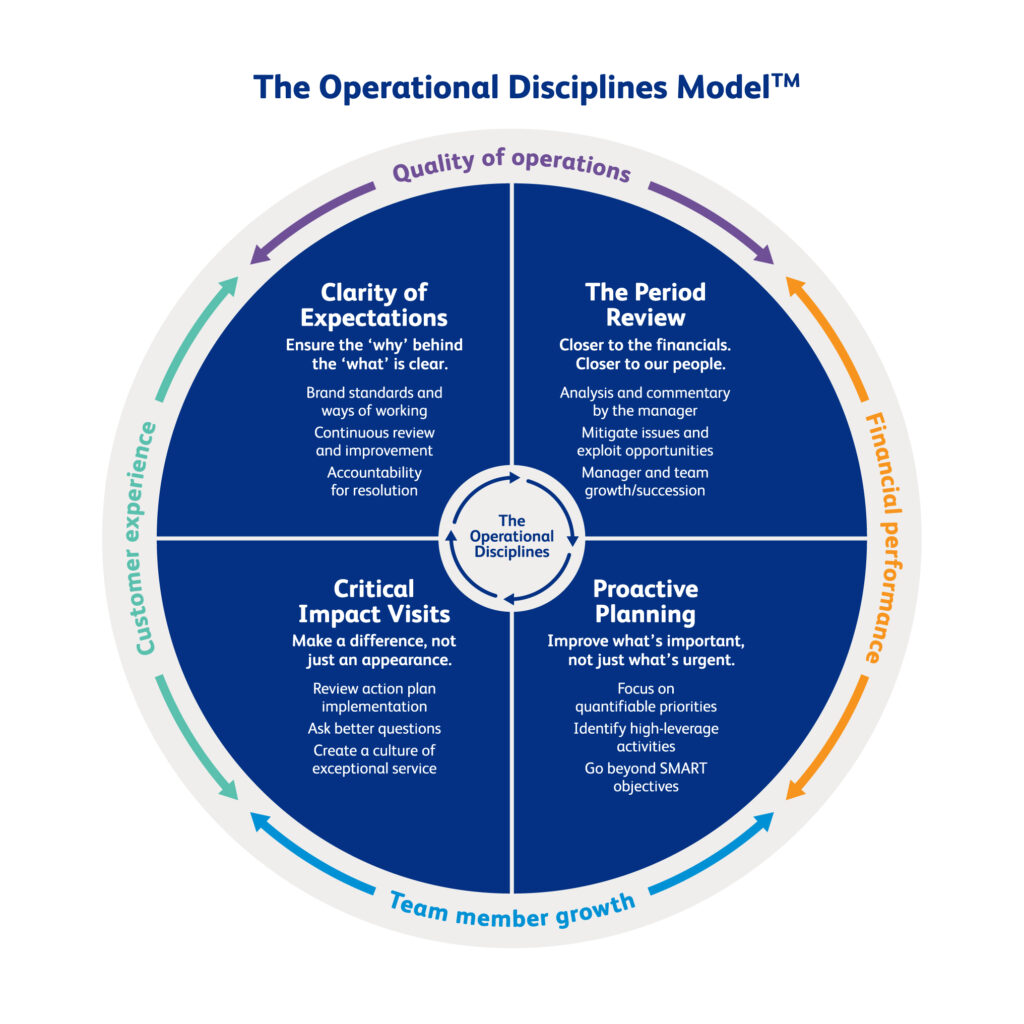
What is operational excellence?
I’ve always believed that operational excellence is achieved when you go beyond simply a consistent adherence to upholding brand standards. At MMU we define it as: “a style of teamwork, problem-solving, and leadership that leads to continuous improvement”.
Our emphasis is on continuous improvement, which requires genuine leadership to make it a reality. In any hospitality, retail, and leisure business – or any organisation that operates over multiple locations – the role of the multi-unit manager is to help build and sustain a culture of excellence. This ranges from the customer’s experience of the brand to the behind-the-scenes operational processes that are necessary to run a successful business.
We know that the road to operational excellence is paved with discipline and consistency and that this is easier said than done!
We have identified four distinct operational disciplines – or practices – that outstanding multi-unit managers need to master to achieve excellence:
- Clarity of expectations
- The period review
- Proactive planning
- Critical impact visits.

You can learn more about each discipline by downloading our guide – Mastering the Operational Disciplines – below. However, in this first (of four blogs), I’ll explore the importance of communicating non-negotiable standards and expectations to our teams.
Clarity for my team. Clarity for our customers.
As Lee Cockerell, former Exec VP of Operations at Walt Disney World, Florida told me when I interviewed him for our podcast: “At Disney operational excellence begins first and foremost with the C-word. Clarity. Clarity in everything, in job role descriptions, during the interview process, so that people understand exactly what’s expected of them, on day one, on day two, three and so on. When was the last time you heard someone complain they had too much clarity in their job?!”
I think Lee is spot on. People need – and welcome – clarity. Whether it’s about their job role, the tasks and activities they’re expected to undertake or the results they need to achieve.
This means ensuring the ‘why’ behind the ‘what’ is clear and includes:
- Brand standards and ways of working
- Continuous review and improvement
- Accountability for resolution.
Too often I hear operators lay this all at the feet of the Standard Operations Manual (SOM) or another department, such as HR when it comes to the recruitment and onboarding of people. Of course, the SOM is critical to achieving operational excellence. Indeed, I’ve always argued that part of solving the clarity conundrum is the need to have excellence codified; clearly recorded and explained, leaving little to interpretation and possible misunderstanding.
Business writer and multi-unit leadership guru, Jim Sullivan, is right to highlight the meaning of the word “non-negotiable”. To many, the expectations and standards that we label as non-negotiable are anything but. Let’s be honest, if nothing happens when the standards are not met (especially when it’s a regular issue) then how can we say the standard is non-negotiable?
The consequence is key
Perhaps, if I may use another “c” from my conversation with Lee Cockerell, the reason why so often non-negotiables are not worth the paper they’re written on is that there are no consequences (good or bad) when someone does and doesn’t deliver.
When it’s done well, and consistently, the consequence should be genuine, fulsome recognition and reward of the individual or team responsible. There’s even an argument, especially in the early days of trying to establish non-negotiables, that managers should amplify what others have done; showcasing the achievement to bring it to the attention of others and to encourage them to follow suit.
When it’s not done well, the consequence is the feedback that redirects the performance. This means clearly pointing out what hasn’t been achieved, why it matters and what the impact is. This doesn’t have to be done in a “tell” style, indeed the best multi-unit managers coach their teams by asking about the standard or non-negotiable first, checking their understanding of what it is, why it matters and how to go about doing it.
Compliance or commitment?
This is absolutely not about creating a compliance culture, where fear of not doing something becomes the primary motivator for doing so. I passionately believe the antidote to this audit-driven, “catch you doing something wrong” approach is building a culture of commitment (not compliance). By clearly explaining the reason for the standard (the why), we help people understand the rationale and the potential impact of it not being delivered.
Of course, you can go even further in building a culture of commitment to standards. As author Stephen Covey explains, “No involvement. No commitment!” Grasp any opportunity that you can to get people involved at the ground level of creating or revising a non-negotiable standard, so that their voice is heard and the likelihood of their ownership and commitment is increased.
Three key actions multi-unit managers should embrace for excellence
To summarise, here are the key actions that multi-unit managers should consistently embrace:
- Clarity – never assume existing members of the team know “why”, or indeed “what” or “how” something is done a certain way. Take the time to explore their understanding and fill in the blanks as often as needed to ensure people understand and can accurately replay the rationale for the standard to you.
- Consequences – look for opportunities to catch people doing something right (not wrong!) and highlight their efforts and successes to reward and encourage them and others to carry on doing it right. Equally, don’t miss coaching opportunities when things don’t go as they should; ask questions to check their understanding of the purpose of the standard and the impact that not achieving it has on customers, colleagues and the business.
- Commitment – use positive recognition to drive commitment to replicate the performance or repeat the task. Whenever feasible, involve as many people as possible, with diverse viewpoints and experiences, when setting or reviewing non-negotiable standards. Their involvement can lead to them taking ownership and giving a commitment to deliver, repeatedly.
Read part two about period reviews. Find out more about how we can support multi-unit managers or get in touch via contactus@masteringmultiunits.com
Mastering the Operational Disciplines
To find out more about the operational disciplines please download our free guide, Mastering the Operational Disciplines.


